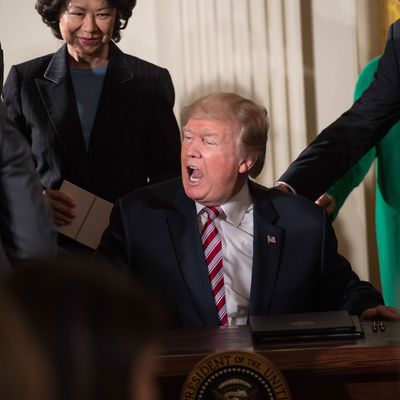
During his campaign, Donald Trump promised to spend $1 trillion on an infrastructure program that he likened to those of the New Deal era. When Hillary Clinton called for $275 billion in infrastructure investment, the Republican nominee vowed to spend at least twice that sum.
Last month, the White House released a budget that allocated $200 billion for spurring public-private partnerships in infrastructure investment — while cutting $144 billion from direct public spending on infrastructure.
The president has yet to release the full details of his new vision for repairing America’s crumbling roads and bridges. But a report from the New York Times on Saturday suggested that Trump’s new plan for federal infrastructure spending is to reduce it:
President Trump will lay out a vision this coming week for sharply curtailing the federal government’s funding of the nation’s infrastructure and calling upon states, cities and corporations to shoulder most of the cost of rebuilding roads, bridges, railways and waterways.
On the first day of Infrastructure Week (which is, apparently, a monthly event), Trump unveiled the first pillar of his new plan: the privatization of America’s air traffic control system.
At present, the Federal Aviation Administration’s system oversees 50,000 flights per day, and is regarded as one of the safest in the world. However, the FAA has been slow to transition from its radar-based system to a more modern, GPS-based one, despite the latter’s potential for enabling quicker routes. The FAA maintains that it has been working diligently to modernize its system, but these efforts have been hobbled by Congress’s failure to supply consistent funding.
On Monday, Trump argued that public-sector red tape and inefficiency were responsible for the FAA’s backwardness. Thus, the president proposed outsourcing air traffic control to a “self-financing, nonprofit organization” that would be funded via user fees, instead of taxes.
The government would still regulate this private company for safety purposes, and over 30,000 FAA employees would retain their jobs, union, and “similar” benefits after being reassigned to the quasi-private sector.
The proposal enjoys strong support from the major airlines. In reporter David Dayen’s view, that fact is a testament to the measure’s flaws:
The plan did not originate with Trump. It actually comes from the airline industry, and its biggest champion in Congress, House Transportation Committee chair Bill Shuster, is literally sleeping with an airline industry lobbyist. It’s no worry because the lobbyist “doesn’t lobby my office,” Shuster reassured reporters in 2015. I would think she doesn’t need to.
… You can also see the influence of the airline industry in how the new system would be funded. Gone would be taxes on airline passengers. In their place would be fees on aircraft … The Big Four airlines have more ability to absorb these costs than start-up competitors or regional carriers that serve smaller cities. Lifting passenger fees would simply give the dominant carriers more legroom (unlike their passengers) to increase their own fees, either through higher fares or endless add-ons for another inch of space or a snack box or carry-on baggage or a pillow. Delta, actually an opponent of privatization, confirmed this in a study last year, showing that travelers would pay 20-29 percent higher costs if the U.S. shifted air traffic control from the FAA. And because of the Big Four’s extreme volume, they can pass on user fee costs in a way the competition cannot.
Regardless, Democrats are unenthused. There was a time when one could have imagined Trump using his infrastructure ambitions to court bipartisan support — or else, to drive a wedge between Team Blue’s pragmatists and its stalwart resisters. But now that Trump’s infrastructure plan appears to consist of schemes for privatizing public resources — and helping Saudi Arabia invest in American toll roads — there’s little dissension in the Democratic ranks.
“The entire focus of the President’s infrastructure ‘proposal’ is on privatization, which sounds like a nice word but when you scratch beneath the surface it means much less construction and far fewer jobs, particularly in rural areas,” Senate Minority Leader Chuck Schumer said on Monday. “It means Trump tolls from one end of America to the other, and huge profits for financiers who, when they put up the money, want to be repaid by the average driver, worker and citizen.”






























